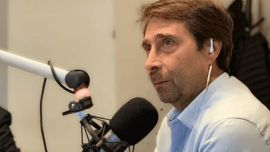The Inter-American Development Bank (IDB/BID) has agreed a loan package with Argentina worth some US$5 billion over the rest of this year and next, it emerged late Tuesday.
Sources in Argentina's government confirmed the agreement between IDB President Mauricio Claver-Carone and Economy Minister Sergio Massa, who is currently in Washington on his first trip abroad since he took office.
In total, the country expects to receive more than US$3 billion this year: US$1.2 billion to swell the dwindling international reserves of Argentina's Central Bank (BRCA) and another US$1.933 billion in credit "programmes," which are still pending approval and signatures, the source, speaking on condition of anonymity to the AFP news agency.
According to an IDB communiqué transmitted on Tuesday evening, several hours after the meeting between Massa and Claver-Carone, the US$1.2 billion due this year corresponds to eight loans already approved by the bank's board of directors that "make an important investment in social infrastructure."
The remaining US$725 million (taking the 2022 total up to US$1.933 billion) constitute the "IDB's financing potential for the rest of 2022," it clarified.
For 2023, "technical teams are in advanced stages of discussion to define the programme of credit operations" that "is expected to add at least another US$1.8 billion," the IDB said.
In total, throughout 2022 and 2023, the amount that the IDB will lend to Argentina amounts to US$4.933 billion, according to the source in Argentina's government.
"Mission accomplished"
"I think that if the minister's mission was to come to unlock what was not only the relationship, but operationally the programme with the IDB, we can say that the minister has accomplished his mission," said laver-Carone at a joint press conference with Massa following their meeting in Washington.
"Having this assertive programme with disbursement dates allows us not only to strengthen the [Central Bank's] reserves but also guarantees financing for the federal state for different programmes and for the provinces," declared Massa, who cited planned investments in roadworks, tourist infrastructure, water and housing.
The government source pointed out to AFP that the disbursements designed to boost international reserves will be made in two tranches: US$500 million on September 30 and the other US$700 million on December 30.
The move "shows the strength that we want our Central Bank to have in reserves to strengthen our currency" because it is "one of the tools" in the country's ongoing fight against runaway inflation, explained Massa.
Price increases are expected to total 80 percent this calendar year, though some experts are forecasting a rate higher than 90 percent.
Massa considers that "uncertainty or doubts" about the relationship between Argentina and the IDB, which has been tense during the last months, have now been cleared up.
In June, President Alberto Fernández criticised the IDB's management during a speech at the Summit of the Americas in Los Angeles.
Erratic" policy
Claver-Carone, who is under investigation following an anonymous complaint accusing him of having an inappropriate relationship with an IDB colleague and of attempting to cover-up the fact via corruption, was nominated and propelled into the post by former US President Donald Trump.
Speaking to the press, he said that Massa's arrival in office had helped to clarify Argentina's economic policy and approach to crisis.
"There was an erratic macroeconomic policy in Argentina" when it should be "cohesive," said the IDB president, who believes that Massa's appointment will allow the government to "speak with one voice."
Massa replaced Silvina Batakis as Argentina's economy minister last month. Batakis lasted less than a month in the post after replacing Martín Guzmán, the architect of Argentina's debt renegotiation with the International Monetary Fund (IMF), who resigned in early July.
"For almost two years," Claver-Carone claimed, "a ministry and part of the Argentine government said one thing to the IDB and another thing to the IMF, so the wires were crossed and there was no clarity."
The IMF agreement and its fulfilment is one of the main subjects on the agenda for Massa's visit to Washington. He is due to meet with the Fund's Managing Director Kristalina Georgieva on Monday.
Under the US$44.5-billion debt restructuring deal agreed with the IMF earlier this year, Argentina has committed to reduce its fiscal deficit from three percent of GDP to 2.5 percent in 2022, followed by 1.9 percent in 2023 and 0.9 percent in 2024.
Coinciding with Massa's visit, an IMF technical team is currently holding meetings with a delegation of Argentine officials in Washington "to work on the second [quarterly] review of the credit programme," an IMF source told AFP.
Massa's visit to the United States began with a full agenda. Earlier on Tuesday, he met with the head of US diplomacy for Latin America, Brian Nichols, and Deputy US Secretaries of State Ricardo Zúñiga and Mark Wells, with whom he discussed global food security, energy and development.
Later in the evening, he dined with Juan Gonzalez, US President Joe Biden's special advisor for Latin America.
He also spoke with Jack Rosen, the president of the American Jewish Congress, and with Marcellus Puig, president of Volkswagen Group Argentina, who confirmed an investment plan worth some US$250 million that will allow for the remodelling and expansion of the auto-manufacturer's plants in Argentina.
– TIMES/AFP




















Comments